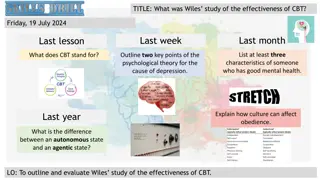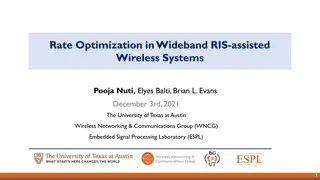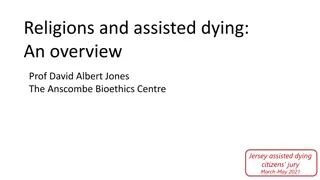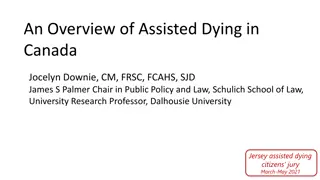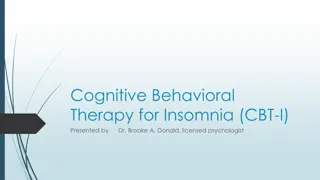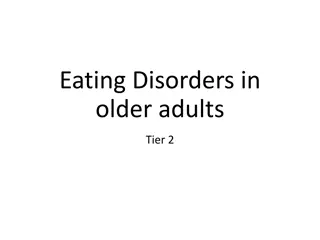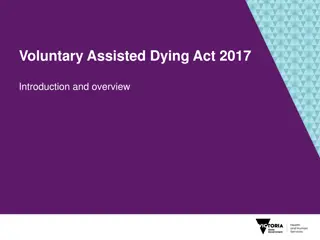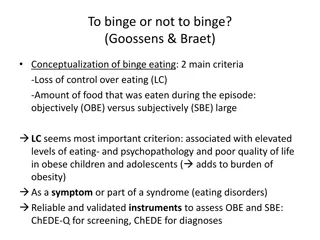CBT-E Assisted Eating at HFU: Strategies and Techniques
Assisted eating aims to help patients apply cognitive behavioral strategies during meals by addressing their difficulties and formulating a recovery mindset. Through open questions, problem identification, exploration, education, and practicing alternative mindsets, individuals can actively engage in their meals and distance themselves from unhelpful thoughts. This structured approach involves socializing the patient, self-monitoring, and challenging the eating disorder mindset to promote positive behaviors and beliefs.
Download Presentation

Please find below an Image/Link to download the presentation.
The content on the website is provided AS IS for your information and personal use only. It may not be sold, licensed, or shared on other websites without obtaining consent from the author.If you encounter any issues during the download, it is possible that the publisher has removed the file from their server.
You are allowed to download the files provided on this website for personal or commercial use, subject to the condition that they are used lawfully. All files are the property of their respective owners.
The content on the website is provided AS IS for your information and personal use only. It may not be sold, licensed, or shared on other websites without obtaining consent from the author.
E N D
Presentation Transcript
CBT-E Assisted Eating at HFU
Aims of assisted eating/meals To apply cognitive behavioural strategies during meals Exactly what assisted eating addresses depends on the nature of the patient s difficulties/their formulation Help the patient to eat actively , not passively Help the patient recognise unhelpful thoughts and decentre from these Help the patient to distance behaviour from thoughts, choosing instead to behave within a recovery mindset Address ritualistic eating behaviour As with all CBTE procedures, the structure is to 1. identify the problem, 2. educate about the problem, and then 3. address the maintaining mechanisms.
General open questions such as: Before meal: Any initial thoughts or worries? How did you manage your anxiety? Looking at the food presented: Talk me through what you re thinking. Thoughts on portion size? What made you choose that meal for your lunch choice is it something you ve had at home/ safe food ? Which part are you going to start with and why? Are you tempted to try to use any dietary rules? During meal: I noticed you have divided the vegetables, carbs and main meal up and wondered why that was? I was wondering what made you start with the smallest slice of toast? How are you doing for time? Try to complete your self- monitoring sheets to record your thoughts, feelings and behaviours in real-time. After meal: How are you going to manage your anxiety/urges to purge or body-check on supervision?
1. Identify the problem Socialise the patient to take an active role Self monitor in real time First meal for assessment Notice ED mindset; patterns in thoughts, behaviours, feelings Review other monitoring forms to identify rules / behaviours to tackle, and plan
2. Explore / educate Examples Have you noticed yourself doing ? How do you think you re doing for time ? What happens if you ? Is that something you have always done ? Does it keep you stuck in the ED mindset or help you move into recovery mindset? Be curious, not judgemental or authoritative Question thoughts and behaviours Notice/acknowledge thoughts associated with ED mindset, and identify patterns Focus on the effect on preoccupation Link to formulation and Life Design
3. Practice alternative mindset Try to adopt the mindset of an athlete before high jumping. They concentrate on the technique to use and not on the fear of falling or on how high the bar may be Directly challenge the ED mindset Distance and decentre from the ED mindset Eat all the planned food without being influenced by internal signs of hunger/ fullness without being influenced by preoccupations of eating and food without rituals Utilise general CBT skills to question thoughts, referring to previous psychoed Directly tackle dietary rules Set homework to continue practising these outside 1:1 sessions, e.g. skills to practise or further challenges to set
Points to remember: Not to say they are wrong/silly or shouldn t think that way Not to tell them what to think or ways of challenging thoughts, but to lead and support Therapy sessions occur on 1:1 basis alongside meals Speed of progression for assisted meals are flexible and adaptable to each individual there is no specific time frame Link in with individual therapist regarding dietary rules, avoided foods, etc.







